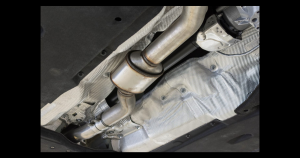 The precious metals inside your catalytic converter perform the remarkable function of transforming toxic emissions into more benign gases. These precious metal catalysts (mostly rhodium, platinum, and palladium) turn over 90% of carbon monoxide, hydrocarbons, and nitrogen oxides into harmless nitrogen, carbon dioxide, and water vapor. When a catalytic converter stops working, the dangerous emissions can potentially poison the driver, so the following signs of trouble should prompt you to quickly visit your local Ford dealer for a new cat.
The precious metals inside your catalytic converter perform the remarkable function of transforming toxic emissions into more benign gases. These precious metal catalysts (mostly rhodium, platinum, and palladium) turn over 90% of carbon monoxide, hydrocarbons, and nitrogen oxides into harmless nitrogen, carbon dioxide, and water vapor. When a catalytic converter stops working, the dangerous emissions can potentially poison the driver, so the following signs of trouble should prompt you to quickly visit your local Ford dealer for a new cat.
Rattling Noises Below You
Cats will usually last ten years or more. But an aging cat eventually breaks down inside. When this happens, the honeycomb meshwork holding the precious metals deteriorates and falls to pieces. You might hear these loose pieces rattling around below you whenever you rev the engine.
Sulfury Smells in the Cabin
Of all the noxious emissions a car engine emits, hydrogen sulfide has the most distinct and unpleasant smell. If you ever detect a strong sulfur smell similar to rotting eggs, pull over and exit your vehicle.
This smell indicates hydrogen sulfide, which is poisonous for humans to breathe. It’s important for you to have your cat inspected by a technician.
Reduced Acceleration Power
Aging, clogged-up cats can start to restrict the flow of air and other gases through your vehicle. When this occurs, the engine won’t be able to draw in as much oxygen as usual.
When starved of oxygen in this way, the engine’s combustion chambers begin to struggle. Your car will lose accelerative power, especially when you need a sudden burst of speed.
Sputtering, Struggling Engine
An oxygen-starved engine will start to misfire, causing it to sputter and judder. These signs of struggling usually become most noticeable when you slow down to pause in idle.
Excessive Heat Below Your Car
If you suspect a faulty cat, you can crouch to check under your car. The backup of trapped emissions will create an excessive amount of heat in the exhaust system. You might notice this extreme heat, but don’t touch the undercarriage with your bare hand, as you will get burned.
How Your Ford Dealer Can Check Your Cat
A trained technician at your local dealership can properly identify a faulty cat, even without removing it and looking inside. They first use tools such as a pyrometer to measure the temperature of the catalytic converter before and after running the car.
If the outlet temperature isn’t a good deal hotter than the inlet temperature, the cat is probably malfunctioning. To diagnose the cause of a misfiring engine, they can also detach a section of exhaust piping upwind of the cat and run the engine to see if this resolves the issue.
Have your catalytic converter repaired or replaced today at Hutch Ford in Paintsville, KY. We have a terrific range of new and used Ford vehicles and a top-notch team of courteous, knowledgeable staff and technicians, just waiting to assist you with your vehicular needs.



